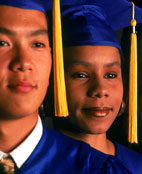| Join Our List |  |
|

Making Music and Having a Blast!
has 7 chapters for college-bound students in Part 10
"Deciding if a Music Career is for You"
for concrete solutions to your everyday problems and ideas to get more satisfaction from the
best job in the world!
|
| It's not worth it unless it's fun! | 
 | | Pachelbel Rant |
|
|
|
Greetings!
This year I've had a little bit too much excitement with my six (!) high school seniors with last-minute requests for recommendations, help with essays, and advice on choosing colleges.
I turned to my friend Karen Iglitzin, well-known professional violinist and college adviser. Karen coached some of my students with college choices, writing essays and personal statements. She's also a master at the "financial aid appeal," helping tell their personal story to get more scholarships and aid. Karen made the process easier, more efficient, and less stressful.
Here's some advice from Karen for you to share with your high school students starting their college journey.
|
|
Advice for the College Bound Teen
| | |
 THE BENEFITS OF STARTING BEFORE SENIOR YEAR!
Many students start thinking about college planning when they are seniors in high school, but there are many advantages of spreading the work over several years. Get more money: Parents who do financial planning with college in mind would do well to start consulting when the student is in middle school, if not before. Have less stress: On the teenager AND the family! Spreading the work out over 6 or 8 months, instead of the senior year 'crush' is a huge help.
|
| What Needs to Get Done? | |  Choose prospective schools: Do a 'self-study' of personality/skills/career ideas, and choose a broad selection of institutions to fit.
Essays: Most private schools expect numerous pieces of writing and all need to be done with care. Essays and "personal statements" can be completed during the summer after Junior year in High School. Please do get started during the summer after Junior year. S.A.T. Test preparation (or ACT, the alternate test) can start as early as sophomore or early junior year with SAT prep books, formal classes, or tutoring. Take the SAT in spring of junior year, allowing time to take it a second time if desired. (Colleges do not prefer students who take too many standardized tests. Do not take SAT "just to see what it's like." The score you get on that "trial" test will not be erased. So try to take it when you are truly ready to take it.) Letters of recommendation: Ask teachers well in advance (before the summer after Junior year or in the beginning of your Senior year) so they can do a good job. |
| Make a Big Impression | | 
Understand the basic distinction between the functions of a résumé and a letter of recommendation.
Résumés are to impress. Avoid the pitfalls of being too lengthy or repetitive. Highlight your main accomplishments but don't 'drown' the reader in a laundry list... Don't mention the 5th grade play.
Letters of Recommendation are to to give in-depth insights to stress your personality strengths. Many writers mistakenly turn this into a mini-résumé. You can learn how to 'help' your writers to a better job for you.
|
| College Prep Timeline | |

Working backwards:
Senior year:
Record Screening Tapes/Videos. For any student doing a music or art supplement, recordings are usually due Dec. 1, which is at least a month before most regular college applications are due.
Auditions:
If your tape makes it past the 'screening" level, live auditions take place during January-March of Senior Year. Plan for an average of three separate live audition trips.
Paperwork: Write essays and personal statements in the summer.
Junior Year:
Do a self study.
Do you want to major in music? minor? double major? Take music classes outside your major field?
Research schools. Find out the programs offered, if you have to be a music major to take music classes or participate in ensembles, if there are music minor or double major degrees.
Choose your 10 favorite schools.
Take college trips:
Visit a selection of types of schools: small, large, rural, city, college, and conservatory. Arrange sample lessons with the key professors at each school and talk to students.
Practice Music Audition Material:
Download the required list from each of your chosen schools. Make a chart of required pieces and dates for auditions.
Sophomore Year: Gather information: What are your interests? Begin family discussions, including the all-important decision about whether or not to be be a music major. Build your résumé with contests, festivals, master classes, and summer camps. Perhaps include an informal college visit during a family trip. Begin to budget for junior and senior year college tours, recording expenses, and college advising services. |
| Karen Iglitzin, College Counseling | | |
Overwhelmed with the college application process? Karen Iglitzin's business, "Common Sense Counseling," helps families of college-bound students (of all majors) with the entire process. Karen can help you prioritize your interests and help you decide whether or not to major in music.
With so many schools and programs to choose from, she can help you select schools that are a good fit. By helping you get more impact from your essays and making your résumé stand out from the pack, you'll have a better chance of those schools choosing you. She also stages mock interviews and offers strategies to handle auditions. After receiving acceptances, she'll help you get the most possible financial aid.

Karen Iglitzin is past first violinist of the Philadelphia String Quartet, professor at Western Washington University, and founder of "Chamber Music Madness" for young people to learn the art and joy of playing classical chamber music.
You can contact Karen at:
206-366-1211 or karen1957@comcast.net
|
| Flute Flash | | 
I love this Tchaikovsy book filled with 19 of the world's greatest and most-loved melodies made playable on flute by James Galway. Galway covers the breadth of Tchaikovsky's works, choosing specific movements from symphonies and concertos, with individual works and extracts from Swan Lake and The Nutcracker. My students have not only honed their sight-reading skills but also their musicality skills as they emote on these deeply romantic pieces. We finally get to play Tchaikovsky! Yummm.
|
|
|